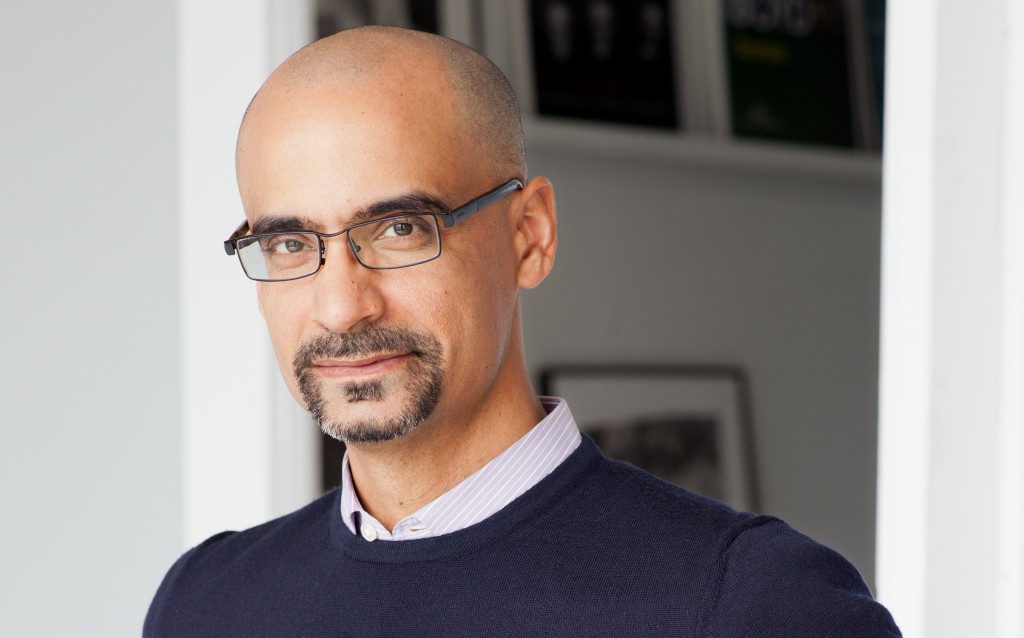Junot Díaz: “We exist in a constant state of translation. We just don’t like it.”
Interview by Karen Cresci
[The translation into English of the initial Spanish-language section of the interview can be found at the bottom of this page.]
One sunny November afternoon I met Junot Díaz in Washington Square. As I waited for him, I wondered whether I should greet him in English or in Spanish. I decided to let him issue the first word. When he got there, he embraced me warmly and said, “Hola!” (Aha, I thought: Spanish.) We started talking about life in New York and about NYU, where he was then Visiting Professor of Creative Writing, and about his visit to the Buenos Aires International Book Fair in 2010. We decided to go to a nearby café, and almost as soon as I began to ask him questions about literature, the writerly Junot came out and began to speak in English.
Díaz, who was born in the Dominican Republic in 1968 and immigrated to New Jersey as a child, speaks a language that is as hybrid as that of many of his fictional characters. With his novel The Brief Wondrous Life of Oscar Wao, he made a place for himself in American letters and has been widely acclaimed in Latin America, as well. He is one of only two Latino writers to win the Pulitzer Prize, and in May, 2010, Díaz became the first Latino to be selected to sit on the board of jurors for the Pulitzer.
Díaz spoke only his mother tongue when he moved to the U.S., but in his adolescence he went years without reading in Spanish, reconnecting with the language as an adult. He says that “returning to a language is like returning to an old relationship—it often requires more courage than striking up a new one.” So my first question was:
¿Cómo funcionó la colaboración con la traducción al español de Eduardo Lago de tu colección de cuentos Drown?
Eduardo was incredibly sensitive about this idea that si estamos hablando de un mercado latino, tú tienes que hacer una traducción neutral, que no puede ser muy español, no puede ser muy mejicano. Eduardo quería realizar una traducción muy neutral porque hay un mercado, pero—imagínate, me tenía al lado—también quería capturar los ritmos caribeños, dominicanos. Había esa tensión. Tienes que mantener the water level, pero también tú quieres calentar la vaina un poquito.
Con la novela era diferente. El narrador de la novela es tan fuerte que no valía la pena tratar de neutralizarlo, porque el tipo es tan agresivo. Eso nos dio más espacio, más libertad.
A Eduardo le interesan mucho los U.S. Latinos. Tu nomás tienes que ver lo que él ha hecho ahí en el instituto Cervantes, todo esos programas para U.S. Latinos, por primera vez. Estamos hablando de un hombre que tenía esa sensibilidad, esa filosofía. Yo creo que eso tiene que ver mucho con su trabajo como traductor, especialmente en ese libro. No es sólo tratar de mantener sonidos, mantener la estética, ese hablar del narrador. Había una orientación U.S. Latino que fue muy importante. There’s a flexibility to his castellano that is not always present in any of us who come from countries where we imagine que nuestro idioma is completely immutable.
We also have to understand that en los Estados Unidos we have a Spanish that is deeply affected by each other’s Spanishes. That un dominicano puede usar palabras mejicanas, palabras cubanas, palabras boricuas. It was important to have that kind of flexibility. It was very useful that Eduardo was oriented around this idea that in any U.S. Latino there are going to exist multiple Spanish registers.
I think that one of the most terrible inheritances of the colonial experience for us Latinos has been our fragmentation. We don’t consider each other’s Spanishes as anything more that idiosyncratic local peculiarities that are wonderful to make jokes about, but we don’t see them as sources of knowledge and experiences. We see them somehow as signifying cultural essences or being part of a moral code or calculus, some sort of moral metric. Because the way you speak represents “Argentineness,” which is a moral position, when we should be thinking of each other’s Spanishes as enormously rich bodies of knowledge, bodies of histories, bodies of experience, and inside of them, embedded in them, there’s an enormous amount of political apparatus. It’s the heartbreak of those of us who work in languages to understand this and to try to find a way to fight it.
It’s almost 20 years since Drown was published and I still have people saying to me:
“Listen, you used a Puerto Rican word here. That’s not Dominican and therefore you’re not Dominican.”
What is the role of English in the translations of your books? If you compare Achy Obejas’ translation of The Brief Wondrous Life of Oscar Wao and Eduardo Lago’s translation of Drown, there’s a lot more English in Obejas’ version.
We certainly talked about this. It often takes a while for you to figure out what the fuck you actually did. I was able to do things in Drown that I didn’t understand. Then one begins to understand it and it makes it easier to create a template for the translation. By the time Oscar Wao came around I was far more aware of the game I have with code-switching, with bilinguality, but also with the, I would call it, ancient somatic tension between English and Spanish. The two languages have felt themselves threatened by each other for a very long time.
The pivot of what we call the modern was around the eclipsing of Spain and the rise of England. The two languages circled each other. At any moment one could have collapsed or taken over far more quickly. For a very long time, the English went to sleep and had nightmares of Spanish. The Spanish would go to bed and have nightmares about the English. This most ancient competition plays itself out in the New World in very interesting and novel ways.
Do you think that discovering a pattern of what you are doing made you more confident to encourage Achy Obejas to include more English in her translation? Or was it her decision?
Both of us. Achy took one look at this and knew that what was important about this was maintaining the code-switching, the presences of both languages, the bilinguality, or better said, “linguistic simultaneity”. I also understood it clearly. When the book was I the first thing I knew was that I was going to do in Oscar Wao what I didn’t have the insight, nor the capacity, nor, I would argue, the facility to have done in the first book.
This pattern wasn’t as clear when Drown came out?
I don’t think it was clear in my head. My immigrant position, both in Spanish and in English—I’m as much an immigrant to Spanish as I am to English—means that I have no confidence of either language or in either language.
Doesn’t that also make you feel safer to play and experiment?
I don’t know, you tell me. When you’re uncomfortable with something do you feel that you can play with it? One should never be too deterministic about this. When you’re not comfortable with something you’re far more likely to be more formulaic.
What was so interesting about this thing is that there were certain translators in different countries who spent way more time harassing me. The French translator, she ended up winning this enormous award for her translation. That woman was on my case 24/7 because she decided to pretend that she didn’t know a word of English. It was fascinating. She decided to pretend that she was an alien to both languages. So the thing that would seem most self evident to you, she would query. And it helped her narrow in on shades of meaning. She got it on the “millimeter wave.” On the X-ray spectrum there’s this thing called the millimeter wave where you can X-ray down to an incredibly fine point. She’d brought her understanding down to that. And it really helped her with her translation. She knew where she could play and where she could go.
What about translations into other languages?
I can’t remember who it was, one of the Eastern European languages. That woman translator was so obsessive that she created 40 pages of queries that in fact ended up being used by everyone else. She just drove me nuts. Every five pages there would be five pages of queries. In the end she was a very good template.
The Japanese translator, rather than to farm out to query me, used the template and formed a team of experts that assisted him.
When I went to Japan, I met the science fiction role playing team. These guys know everything about table-top role playing games and therefore were able to assist them with even the most esoteric references which none of the European or Latin American translators cared about. When they would encounter “nerdish” they would skip over. It was so interesting. The Japanese took it very seriously. They figured out more than anyone else that the true meaning of the novel was in the nerdish. So they provided for their readers a key with all of them. They got almost everything. The head guy was basically crowd sourcing to a couple of thousand Japanese role-playing people. He would put a reference out that nobody in the Earth would know. There was a map from a role playing game. Not in the rules, not in the body of the text, but a map. In the map there was a location. I made a joke about a role playing game map that only has a thousand copies. These motherfuckers found it! That was most satisfying.
This is what I mean, we’re beginners. The way we think that our demotic idiosyncrasies that are idiomatic expressions are things that can be dispensed with, that we can find equivalences and therefore strip the text of all of its history, all of its politics—because usually that’s where the body of knowledge, the folkloric knowledge rests. These guys sought to understand it at every level, including the role playing games, because there is an enormous political charge in the role-playing references in the novel.
And that is belittled because of generic status?
Without question. Role-playing games are in narrative rankings what code-switching Spanish is in castellano. It’s amazing how you can give deference to one but still get rid of the other. Even the people who were sensitive to one set of registers were completely dismissive of others.
Do you enjoy working with translators?
We exist in a constant state of translation. We just don’t like it. We don’t like to be reminded that we are translating this experience. Translators remind us of our relationship with language the way not everyone is comfortable with. The idea that I would be perturbed or burdened by the only thing I do naturally which is to translate… Again, because I don’t have a natural language I’m not troubled by people who remind me of that. I don’t think it’s some virtue of mine, I think it’s just an accident of me, not a value that I have somehow cultivated.
You once said that “being read outside the U.S. now doesn’t change that my primary readership is still close to home. I don’t have an internationalism running through me.” Has this changed after Oscar Wao?
I think that what I was speaking to was the specificity of audience. Which is to say that for me what makes work rise to the universal, what makes work able to cross borders so that people are interested is by maintaining an obsessive particular focus on strategic audience. By keeping the audience incredibly local, or incredibly narrow you in fact become universal because the universal rises out of the particular. My audience, while narrow, is diasporic. It’s a very small group on both sides of this divide that we call immigration in Santo Domingo and the U.S.
What I’ve learned most significantly is that our geographic national projects for language are rarely more than inane simplifications. I think I have no more understanding of the way the immense wave of language works than a guy that surfs really well and speaks to this profound understanding of oceanic forces. The older I get and the more time I spend in language work, the more aware I am of how little I understand the powerful forces that have allowed both English and Spanish to spread across the world, to thrive, to create entirely new edifices for themselves, which permits the kind of linguistic simultaneity that I so thrill in.
How do you feel when you are labeled as “Latino”?
In my mind, names are a question to which there is never an answer. If we think that these names are answers, clearly we are never gonna be satisfied with any of them.
Names are both local and collective. It’s not enough if you wanna call yourself “reina.” If no one else does, how valid is your name? I think there is always an individual response and then there’s collective interaction.
I have absolutely no problem with being Latino as long as it doesn’t eliminate the fact that I’m also Dominican, and African diasporic, and from New Jersey. We can use these names strategically, sentimentally, politically, collectively, and I don’t see any problem in this.
Certainly I would argue that “Hispanic” is such a stupid name because it serves no real purpose, it’s ugly. I’m just offended on an aesthetic level. Only someone who doesn’t like to dance thinks Hispanic sounds good.
Because we are marginalized and subaltern, we take offense about generalities they way that people in power never will. Americans…There’s no such thing as an American! They are so incredibly fractured, but because there’s privilege in the fiction people have no problems with it. We, on the other hand, take offence at the fiction. I sometimes think it is because it would ask us to the occasion as a collective. Secretly we are afraid to identify as a collective. We’ve got too much the subaltern in us. I think there is unnecessary dialectics between self-identification, collective identification. This seems like the status of ‘native’ as a nervous condition that Fanon describes.
When the interview was over, Junot started speaking Spanish again: “No terminaste tu café,” he said—“You didn’t finish your coffee.” Junot, a Latino not afraid of identifying with his community, has done much to tell the story of his people in his work. His short story “Monstro,” a dystopic tale that takes place on the island of La Española, was published last spring in The New Yorker’s special Science Fiction Issue. That story serves as the point of departure for his next novel, also titled Monstro, to be released at an as-yet undetermined date. His last book, the short story collection This Is How You Lose Her, was released in the United States on September 11 of last year.
* *
Image: Nina Subin
Coming soon: A review of This Is How You Lose Her by Carmen Machado.
* *
[Translation of opening paragraphs of the interview; text in italics originally appeared in English. Click here to go back to the beginning.]
How did the collaboration between you and Eduardo Lago on the translation into Spanish of your short story collection Drown work?
Eduardo was incredibly sensitive about this idea that if we’re talking about a Latino market, you have to do a neutral translation, which can’t be too Spanish or too Mexican. Eduardo wanted to do this very neutral translation because there is a market, but—you know, he had me there—he also wanted to capture the Caribbean and the Dominican rhythms. There was that tension. You have to maintain the status quo, but you also want to cause a little stir, at the same time.
It was different with the novel. The narrator of the novel is so intense that there was no point in trying to neutralize him, because the guy is just so aggressive. That gave us a little more room, more freedom.
Eduardo is very interested in Latinos in the U.S. Just look at everything he’s done at the Cervantes Institute, all those programs for Latinos in the U.S., for the first time ever. We’re talking about a man with that sensitivity, that philosophy. I think that has a lot to do with his work as a translator, especially with that book. It’s not just trying to keep sounds, maintain the aesthetic, that way of speaking that the narrator has. There was a U.S. Latino orientation that really determined a lot. There’s a flexibility to his Spanish that is not always present in any of us who come from countries where we imagine that our language is completely immutable.
We also have to understand that in the United States we have a Spanish that is deeply affected by each other’s Spanishes. That a Dominican may use Mexican words, Cuban words, Puerto Rican words. It was important to have that kind of flexibility. It was very useful that Eduardo was oriented around this idea that in any U.S. Latino there are going to exist multiple Spanish registers.
[ + bar ]
O único final feliz para uma história de amor é um acidente
Não posso vê‐la esta noite
Tenho que desistir
Então vou comer fugu
Yosa Buson (1716‐83)
1.
Antes do sr. Atsuo Okuda abrir a caixa, tudo estava... Read More »
Yolanda Castaño
“Aquí o que nos falla é que non nos sabemos vender”, queixábase seguido o teu patio de veciños; pero cando chegou para o quinto dereita aquel tipo que si o sabía... Read More »
La Inestable [lima]
Alicia Bisso translated by Heather Cleary
I never liked poetry. My self-imposed task of learning to read it began with a strange discovery. One afternoon, a traffic jam... Read More »
Good Enough for Jesus
Russell Scott Valentino
“If English was good enough for Jesus, it’s good enough for me.” —Texas Governor “Ma” Ferguson (apocryphal)
He doesn’t want to say the wrong thing. Who knows what... Read More »



![La Inestable [lima]](http://www.buenosairesreview.org/wp-content/uploads/La-Inestable-700x500.jpg)




 sending...
sending...